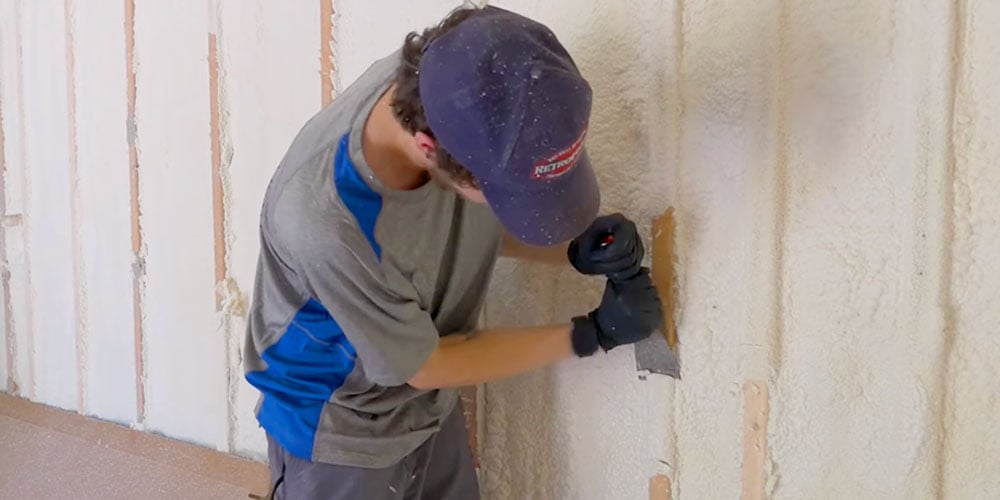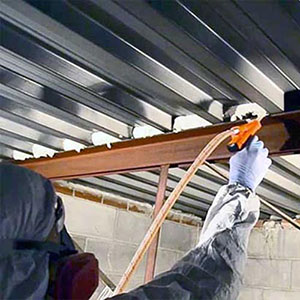How Spray Foam Can Boost Energy Efficiency in your house
How Spray Foam Can Boost Energy Efficiency in your house
Blog Article
Spray Foam: The Ultimate Remedy for Air Sealing and Insulation
Spray foam insulation has actually emerged as a leading service for effective air sealing and thermal insulation, offering an one-of-a-kind combination of residential or commercial properties that establish it besides conventional techniques. Its capability to broaden and load gaps makes it specifically efficient in preventing air leakage, which can dramatically affect energy effectiveness. Nevertheless, understanding the full range of its advantages, installment procedures, and comparisons with other insulation kinds is important for making informed choices. As we check out these aspects, the effects for both brand-new constructions and retrofits become progressively significant. What variables should influence your selection?
What Is Spray Foam?
Spray foam is a flexible insulation material that integrates the principles of air securing and thermal resistance to boost energy performance in buildings. Made up largely of polyurethane or various other similar compounds, spray foam is used as a fluid that broadens upon call with surfaces, developing a solid, continual layer of insulation. This special building enables it to fill spaces, cracks, and gaps that conventional insulation materials might ignore, offering a remarkable air seal.
There are two main kinds of spray foam: open-cell and closed-cell. Open-cell spray foam is lighter and more flexible, providing excellent noise absorption and a lower R-value per inch - Spray Foam. On the other hand, closed-cell spray foam is denser, offering a greater R-value, moisture resistance, and added architectural integrity to building parts
The application procedure usually involves specialized devices, guaranteeing a smooth application that sticks to various substrates, consisting of wood, metal, and concrete. This versatility makes spray foam suitable for both new building and constructions and retrofitting existing structures. Its ability to produce a closed obstacle significantly adds to reducing energy consumption and enhancing indoor air quality, therefore making it a recommended selection amongst property owners and contractors alike.
Advantages of Spray Foam Insulation
Among the most substantial benefits of spray foam insulation is its remarkable capacity to produce a continuous air obstacle, which successfully lessens power loss. Unlike typical insulation products, spray foam increases to fill spaces and fractures, ensuring that air leakage is substantially decreased. This particular not just enhances power performance but additionally leads to reduce energy expenses in time.
In addition, spray foam insulation provides exceptional thermal resistance, adding to an extra secure interior environment. Its high R-value per inch allows for efficient insulation in restricted areas, making it suitable for attics, wall surfaces, and crawl spaces. The moisture-resistant residential properties of spray foam help stop mold and mildew and mold development, advertising healthier living conditions.
One more important benefit of spray foam insulation is its sound-dampening qualities (Spray Foam). It effectively minimizes sound transmission between spaces, creating a quieter and more comfortable home setting. The resilience of spray foam additionally stands out, as it does not droop or clear up with time, preserving its efficiency throughout its lifespan
Exactly How Spray Foam Works
Understanding exactly how spray foam insulation functions is crucial for appreciating its effectiveness in air sealing and thermal resistance. Spray foam insulation includes two main components: isocyanate and polyol material. When these elements are combined, they undertake a chain reaction that triggers the product to increase swiftly, producing a thick foam that fills fractures, spaces, and tooth cavities.
As the foam broadens, it adheres to surfaces, creating an airtight seal that significantly decreases air seepage. This particular makes spray foam insulation very reliable at avoiding drafts and wetness infiltration, which can lead to energy loss and damage over time. Furthermore, the closed-cell version of spray foam supplies exceptional thermal resistance as a result of its rigid structure, properly minimizing warm transfer.
The distinct residential properties of spray foam allow it to adapt irregular surfaces, making sure extensive protection and a smooth obstacle. Because of this, spray foam insulation not only boosts energy performance but additionally adds to boosted interior air high quality by minimizing the accumulation of irritants and toxins. Ultimately, comprehending the auto mechanics behind spray foam underscores its duty as a premium selection for insulation and air sealing in both domestic and industrial applications.
Installment Refine Overview

Before installment, the room must be sufficiently cleaned and prepped, making sure that surfaces are cost-free from particles, dust, and wetness. Due to the fact that impurities can endanger attachment and total efficiency, this step is essential. Once the location is prepared, the application includes blending the 2 parts of the spray foam, which expands upon call and loads spaces effectively.
Educated professionals should conduct the setup, making use of specialized equipment to guarantee uniform protection and ideal density. Security preventative measures, consisting of using protective equipment and guaranteeing correct ventilation, are important throughout this procedure. After application, the foam usually remedies quickly, developing a strong obstacle that enhances energy efficiency.
Contrasting Spray Foam to Conventional Insulation
When assessing insulation choices, spray foam insulation attracts attention in comparison to standard materials such as fiberglass and cellulose. Among the main advantages of spray foam is its superior air sealing capacities. Unlike fiberglass and cellulose, which can enable air seepage, spray foam increases upon application, filling up gaps and holes to develop an airtight seal. This causes improved power efficiency, as less heated or cooled air runs away the home, causing lower energy expenses.
Furthermore, spray foam supplies a higher R-value per inch than traditional insulation types, using even more reliable thermal resistance in a thinner account. This characteristic is especially advantageous precede with minimal dental caries deepness. Spray foam is resistant to wetness and mold growth, which can be a substantial problem with cellulose and fiberglass, specifically in damp environments.
However, spray foam insulation generally lugs a greater look what i found in advance cost than its typical equivalents. House owners need to weigh this first investment against long-lasting energy savings and efficiency benefits. Inevitably, while both insulation kinds offer their function, spray foam becomes an advanced service for modern-day insulation demands, especially in terms of air sealing and thermal effectiveness.

Final Thought
In recap, spray foam insulation stands for a highly efficient remedy for accomplishing optimum air securing and thermal resistance. Its unique residential or commercial properties, consisting of dampness resistance and audio dampening, make it ideal for numerous applications in both new constructions and retrofitting projects (Spray Foam). Although the preliminary prices might be greater compared to traditional insulation materials, the lasting advantages, such as significant energy savings and improved interior air quality, warrant the investment and emphasize its worth in contemporary building practices.
Spray foam insulation has emerged as a leading remedy for effective read air securing and thermal insulation, providing an one-of-a-kind mix of residential properties that set it apart from typical methods.Spray foam is a flexible insulation product that integrates the concepts of air securing and thermal resistance to boost energy efficiency in structures.When examining insulation choices, spray foam insulation stands out in contrast to standard materials such as fiberglass and cellulose. Eventually, while both insulation kinds serve their objective, spray foam arises as an extra advanced option for modern insulation needs, especially in terms of air securing and thermal click here for more efficiency.
In recap, spray foam insulation represents a very reliable remedy for accomplishing optimum air securing and thermal resistance.
Report this page